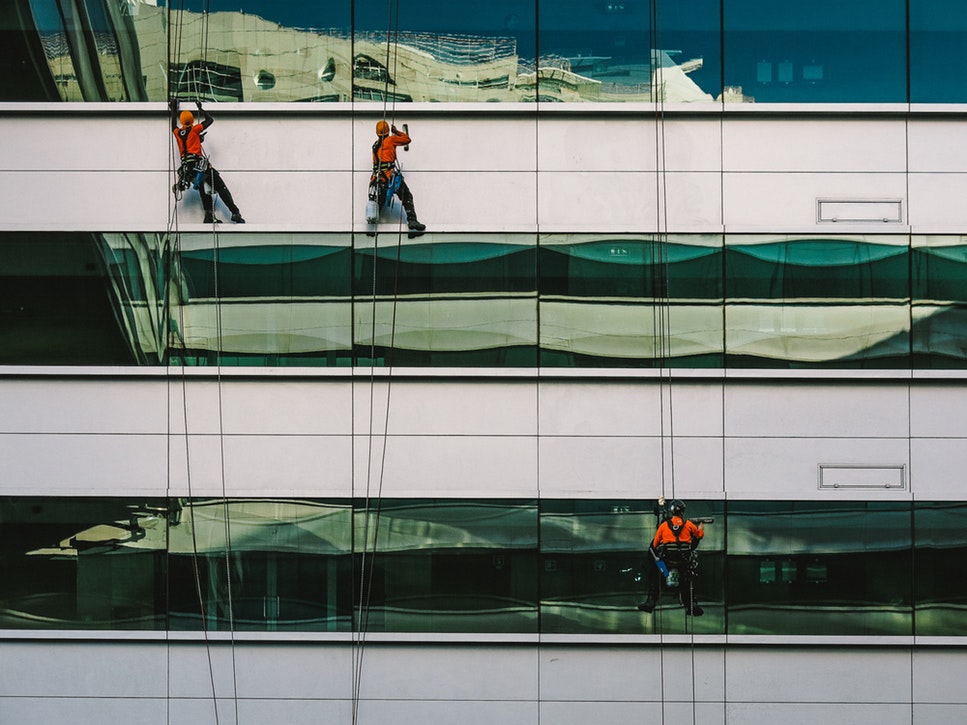 What would New York City be without the towering skyscrapers that dominate so much of the city’s skyline? And how much duller would those architectural achievements look if their windows didn’t shine brightly throughout the day? High-rise window washers keep those windows clean and clear for people inside to look out and for others to see the beauty of the city shining off their glass. But this work presents very real dangers, both for the window washers who brave such terrifying heights and for pedestrians below.
What would New York City be without the towering skyscrapers that dominate so much of the city’s skyline? And how much duller would those architectural achievements look if their windows didn’t shine brightly throughout the day? High-rise window washers keep those windows clean and clear for people inside to look out and for others to see the beauty of the city shining off their glass. But this work presents very real dangers, both for the window washers who brave such terrifying heights and for pedestrians below.
Window Washing in New York
Just like on a house, the windows on skyscrapers, high-rises, and other large office buildings all need to be cleaned as a part of regular maintenance. Businesses that lease office space in a high-rise expect their employees and managers to have clear views out of their offices, which is part of what they are paying for. The men and women who keep these windows clean do so from outside the building, often hundreds of feet up in the air, suspended above the street below.
Different methods are used by window washers to remain suspended outside a building and clean it. Many high-rises have rigging on the roof of the building, which window washers attach to a scaffold on ropes, which is then lowered down from the roof to give the cleaners access to windows. In situations that are not quite so high up, it is not unusual for a window washer to clip onto a bolt driven into the side of a building and remain attached while washing the windows. Safety harnesses, ropes, and belts are all used every day, and the lives of the washers using this equipment are always at stake.
Dangers to Window Washers
The biggest risk for window washers is, of course, falling from a great height due to a failed piece of safety equipment. While washers often work hundreds of feet in the air, a fall of 50 or 60 feet is likely to be fatal. If a scaffold disconnects or breaks and a worker falls hundreds of feet, it is almost guaranteed to be fatal.
Even if safety equipment works properly, there are still other risks to window washers. At high elevations, winds can become quite strong, especially with the layout of the city as wind rushes between buildings and down streets. These winds often threaten to pull a window washer from the side of a building.
Dangers to Pedestrians
Window washers are not the only ones in danger, however, as their position means that accidents can also impact the people below them. Pedestrians have been struck by equipment and tools dropped or knocked off of scaffolds by window washers, sometimes with catastrophic consequences. While window washers always have to keep themselves safe, it is important that they keep in mind the responsibility they have to others while on the job.
Tools should be fastened with ropes and straps that keep them from falling all the way to the ground below. Everything used by window washers needs to be secured and double-checked to make sure accidents do not happen. Even a small, light-weight item, after falling several hundred feet, can become lethal to pedestrians walking along the city sidewalks.
Safety Regulations and Laws
Window washers have to follow regulations set by the Occupational Safety and Health Administration (OSHA) and state and city laws. When it comes to worker safety, New York is one of the most regulated places in the country. OSHA guidelines cover things like scaffold conditions, safety harnesses and equipment that must be used, how to store equipment not in use, and mental and physical conditions that must be met by workers. Different laws place responsibility for upholding them on workers, employers, and building owners.
Liability after an Accident
Who’s liable for an accident typically comes down to who was negligent—who acted in an unreasonable way to cause the accident that harmed someone. Since different laws and guidelines place responsibility for safety on different parties, the nature of the accident will impact who is liable for that accident.
For example, consider an incident in which a heavy bolt drops and strikes a pedestrian on the street below. If that bolt came out of a building because the building’s owner did not ensure the bolt was firmly placed, the owner could be liable. On the other hand, if the bolt came out of a piece of equipment that the washer’s employer did not maintain, the employer may be liable. However, if the washer was holding the bolt and dropped it, the washer might be partially liable.
It can get complicated, which is why having a top New York City personal injury lawyer is so important in these kinds of situations. For a free consultation with one of them, please call Wingate, Russotti, Shapiro, Moses & Halperin, LLP, at (212) 986-7353. We’ve handled both window washing accidents and accidents involving falling objects successfully for our clients, so we know what to do to get you the compensation you deserve.
